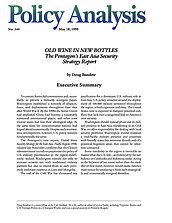The Pentagon’s new report, United States Security Strategy for the East Asia Pacific Region: 1998, released last November, confirms that the Clinton administration intends to perpetuate the policy of U.S. military preeminence in the region indefinitely. Indeed, Washington intends not only to increase security ties with traditional military partners but also to extend them to such previously irrelevant countries as Laos and Mongolia.
The end of the Cold War has eliminated any justification for a dominant U.S. military role in East Asia. U.S. policy, centered around the deployment of 100,000 military personnel throughout the region, is both expensive and risky. The United States now is expected to dampen potential conflicts that lack even a tangential link to America’s own security.
Washington should instead phase out its military presence in East Asia, transferring to its Cold War era allies responsibility for dealing with local security problems. Washington should maintain a mid-Pacific military presence and cooperate with friendly states but intervene directly only if a potential hegemon arises that cannot be otherwise contained.
Some instability in the region is inevitable no matter what the U.S. role — as evidenced by the turbulence in Cambodia and Indonesia today. Acting as the balancer of last resort rather than the meddler of first resort, however, would make America more secure by insulating it from such strategically and economically marginal disorders.


